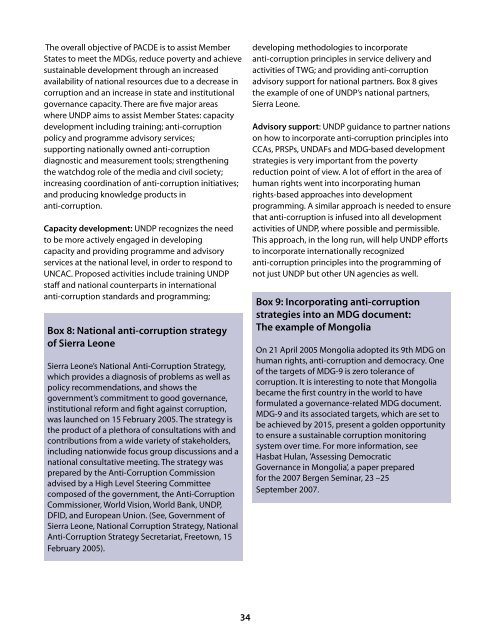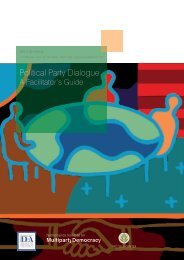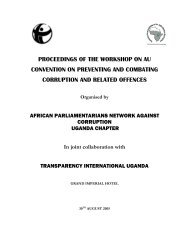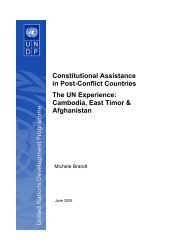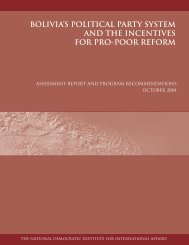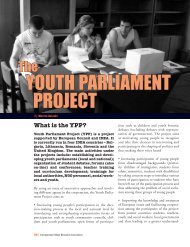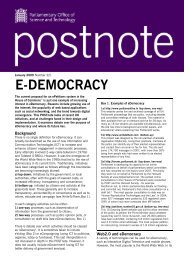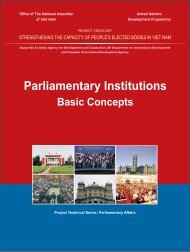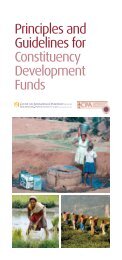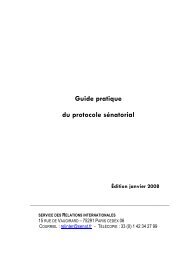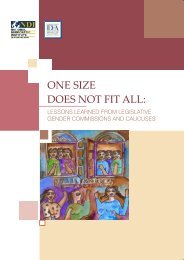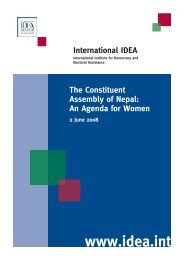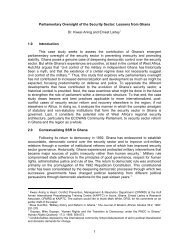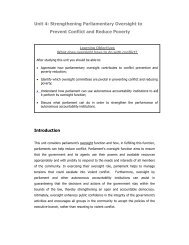Corruption and Development - pogar
Corruption and Development - pogar
Corruption and Development - pogar
Create successful ePaper yourself
Turn your PDF publications into a flip-book with our unique Google optimized e-Paper software.
The overall objective of PACDE is to assist Member<br />
States to meet the MDGs, reduce poverty <strong>and</strong> achieve<br />
sustainable development through an increased<br />
availability of national resources due to a decrease in<br />
corruption <strong>and</strong> an increase in state <strong>and</strong> institutional<br />
governance capacity. There are five major areas<br />
where UNDP aims to assist Member States: capacity<br />
development including training; anti-corruption<br />
policy <strong>and</strong> programme advisory services;<br />
supporting nationally owned anti-corruption<br />
diagnostic <strong>and</strong> measurement tools; strengthening<br />
the watchdog role of the media <strong>and</strong> civil society;<br />
increasing coordination of anti-corruption initiatives;<br />
<strong>and</strong> producing knowledge products in<br />
anti-corruption.<br />
Capacity development: UNDP recognizes the need<br />
to be more actively engaged in developing<br />
capacity <strong>and</strong> providing programme <strong>and</strong> advisory<br />
services at the national level, in order to respond to<br />
UNCAC. Proposed activities include training UNDP<br />
staff <strong>and</strong> national counterparts in international<br />
anti-corruption st<strong>and</strong>ards <strong>and</strong> programming;<br />
Box 8: National anti-corruption strategy<br />
of Sierra Leone<br />
Sierra Leone’s National Anti-<strong>Corruption</strong> Strategy,<br />
which provides a diagnosis of problems as well as<br />
policy recommendations, <strong>and</strong> shows the<br />
government’s commitment to good governance,<br />
institutional reform <strong>and</strong> fight against corruption,<br />
was launched on 15 February 2005. The strategy is<br />
the product of a plethora of consultations with <strong>and</strong><br />
contributions from a wide variety of stakeholders,<br />
including nationwide focus group discussions <strong>and</strong> a<br />
national consultative meeting. The strategy was<br />
prepared by the Anti-<strong>Corruption</strong> Commission<br />
advised by a High Level Steering Committee<br />
composed of the government, the Anti-<strong>Corruption</strong><br />
Commissioner, World Vision, World Bank, UNDP,<br />
DFID, <strong>and</strong> European Union. (See, Government of<br />
Sierra Leone, National <strong>Corruption</strong> Strategy, National<br />
Anti-<strong>Corruption</strong> Strategy Secretariat, Freetown, 15<br />
February 2005).<br />
developing methodologies to incorporate<br />
anti-corruption principles in service delivery <strong>and</strong><br />
activities of TWG; <strong>and</strong> providing anti-corruption<br />
advisory support for national partners. Box 8 gives<br />
the example of one of UNDP’s national partners,<br />
Sierra Leone.<br />
Advisory support: UNDP guidance to partner nations<br />
on how to incorporate anti-corruption principles into<br />
CCAs, PRSPs, UNDAFs <strong>and</strong> MDG-based development<br />
strategies is very important from the poverty<br />
reduction point of view. A lot of effort in the area of<br />
human rights went into incorporating human<br />
rights-based approaches into development<br />
programming. A similar approach is needed to ensure<br />
that anti-corruption is infused into all development<br />
activities of UNDP, where possible <strong>and</strong> permissible.<br />
This approach, in the long run, will help UNDP efforts<br />
to incorporate internationally recognized<br />
anti-corruption principles into the programming of<br />
not just UNDP but other UN agencies as well.<br />
Box 9: Incorporating anti-corruption<br />
strategies into an MDG document:<br />
The example of Mongolia<br />
On 21 April 2005 Mongolia adopted its 9th MDG on<br />
human rights, anti-corruption <strong>and</strong> democracy. One<br />
of the targets of MDG-9 is zero tolerance of<br />
corruption. It is interesting to note that Mongolia<br />
became the first country in the world to have<br />
formulated a governance-related MDG document.<br />
MDG-9 <strong>and</strong> its associated targets, which are set to<br />
be achieved by 2015, present a golden opportunity<br />
to ensure a sustainable corruption monitoring<br />
system over time. For more information, see<br />
Hasbat Hulan, ’Assessing Democratic<br />
Governance in Mongolia’, a paper prepared<br />
for the 2007 Bergen Seminar, 23 –25<br />
September 2007.<br />
34


